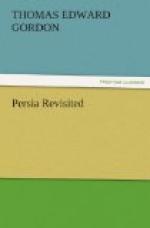Near Rudbar commences the thick growth of various hard-wood trees, which flourish well in the damp soil of the Caspian slopes and lowlands, and in November their foliage was surpassingly lovely, with many warm tints, from delicate red to deep russet and shades of shot-green and brown. On some of the high, thickly-wooded hills, the different colours ran in well-defined belts, showing where particular kinds of trees had found most favourable soil, and had grasped it to the exclusion of all others.
About forty miles from the Caspian coast I fell in with rain and mud—such mud as cannot be realized without being seen. I embarked at Enzelli on board a small Russian steamer, the Tehran, which had taken the place of one of the usual large vessels employed on the mail-service. The sea was rising as I embarked, and I was lucky in getting on board before the surf on the bar at the mouth of the lagoon became impassable. The steamer had five hundred tons of iron cargo on board, machinery for electric light and other purposes, intended for Tehran, but which could not be landed owing to the rolling sea. It was therefore carried back to Baku, a second time within a fortnight, for accident had prevented it being landed on the previous voyage.
There is always this risk of wind and weather preventing landing at Enzelli. Proposals have been made to remove the bar sufficiently to allow steamers of eight hundred tons to pass into the lagoon harbour; but the expense of doing this, and keeping up dredgers, would be great—too great, it is thought, to allow of any profitable return. The same landing difficulties are experienced at Astara and Lenkoran, the places of call between Enzelli and Baku. Should there be any intention of eventually making a railway from the coast to Kasvin and Hamadan, there to meet a line to Baghdad, then it would be the best course in every way to connect Resht with Baku by a railway along the coast, passing through Astara and Lenkoran.
The coast country is famous for its rice, which could be extensively cultivated, and the resources in forest and fishery produce are great. There would be considerable local traffic as the country opened up, and the through trade in oil from Baku would be a paying one. I believe the Russians know that it would be cheaper to build a railway along this coast-line of about three hundred miles, with such trade capabilities, than, in the absence of harbours, to erect breakwaters, make sheltered anchorages, and dredge navigation channels. For two-thirds of the distance the line would lie in Russian territory.
I met at Enzelli a foreign artist, whose acquaintance I had formed in Tehran, where he made some good pictures of local life and scenery. He was loud in his complaints of the elements—the heavy rain and the awful mud. He had come down the road with a minimum of travelling comforts, and had been rather miserable. On going off to the mail-boat in the steam-launch, he vented his feelings of disgust with Persia by spitting over the side towards the land, and saying, ’Ach! ach! what a country! ‘May I never see it again!’ When I reminded him of Tehran and its club, he acknowledged that he had enjoyed his stay there, and appreciated the place; but the rain and sea of mud at Resht had drowned and smothered all his pleasant memories of Persia.




